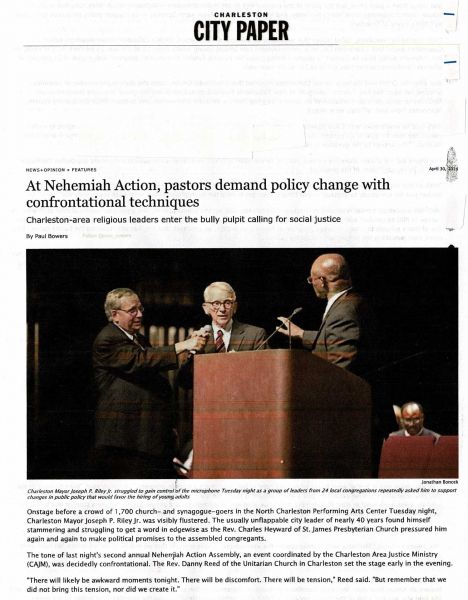The Nehemiah Action Alliance Confronts Mayor Riley
The Nehemiah Action Alliance Confronts Mayor Riley
This article appeared in the April 30. 2014 issue of the Charleston City Paper, one of Charleston, South Carolina's free newspapers, and described a meeting at the North Charleston Performing Arts Center, between the Nehemiah Action Alliance, led by a delegation of area religious figures, and the mayor of Charleston, Joseph P. Riley. The article reports that the delegation stepped into the "bully pulpit," against the mayor, "calling for social justice."
Close to 1700 members of the Nehemiah Alliance packed the center. Basically, the Alliance, led by Reverend Charles Heyward, tried to strong-arm the mayor into providing after-school programs for disadvantaged children, setting up a committee to study ways to reduce juvenile deliquency, and to create job-opportunities for young people. Heyward's tactics left Mayor Riley "struggling to get a word in edgewise."
Riley found addressing the assembly difficult because Alliance leaders would not let him hold the microphone. When they pressured him to accept their proposals on the spot, he said, "The answer is no, and I'm going to hold the microphone."
The City Paper also stated that the Alliance invited North Charleston Mayor Keith Summey to the meeting, but Summey turned the invitation down. He said the Alliance did not offer him a chance to speak and told him "he would only be allowed to give yes-or-no answers to their policy proposals." When asked about this, Alliance members said they worried that Summey "would seek to discredit our organization."
Truthfully, Summey could do worse things than that. He could topple the house of cards that the Civil Rights Movement has become by puncturing the Alliance's group-think bubble and allowing the fresh air of skeptical honesty to tone down the Alliance's rhetoric.
The Blacks have returned to a second-class status in relation to the Whites. The Alliance's treatment of Mayor Riley may gall some people, but it also reveals how dependent the Blacks have become on the Whites. They can no longer deal with the challenges to their society, but must rely more and more on the Whites for solutions, and that leads to a loss of faith in their ability to take care of their own.
Malcolm X stated in a speech long ago, "So we're all black people, so-clled negroes, second-class citizens, ex-slaves. You're nothing but an ex-slave. You don't like to be told that. . . ."
But what Malcolm X said in a spirit of protest during the 1950s, contemporary Blacks accept as the status quo. Accepting their ex-slave, second-class status does not make them any happier, but until they have the courage and the character to step away from White paternalism, they will continue to operate with a deficit of self-respect. The Whites can give them other things, but self-respect has to come from within. The Whites can't give them that.
The absence of a political party, usually the starting-point for nationalist aspirations, indicates to me the absence of a Black cultural core. The reason is simple. Up to now, blacks have channeled all of their needs through White institutions. They move forward by browbeating the Whites to do things for them that they should be doing for themselves.
Blacks, Whites, and nearly everyone else depend on their leaders for self-definition. White leaders have proven themselves forward-thinking, innovative, and pragmatic. Black leaders, on the other hand, spend all their time blaming the Whites. The most Black people can do is march around in circles, saying "Black lives matter!" and "Down with racism!" Their leaders don't orientate them to think independently and futuristically. Black leaders don't give their people personal values and a sense of personal involvement in anything. So they remain behind everyone else.
If the basic components of human psychology are pretty constant across the human spectrum. What differentiates the Whites and Blacks in this country is the lack of real leadership for the Blacks. White leaders think futuristically.

